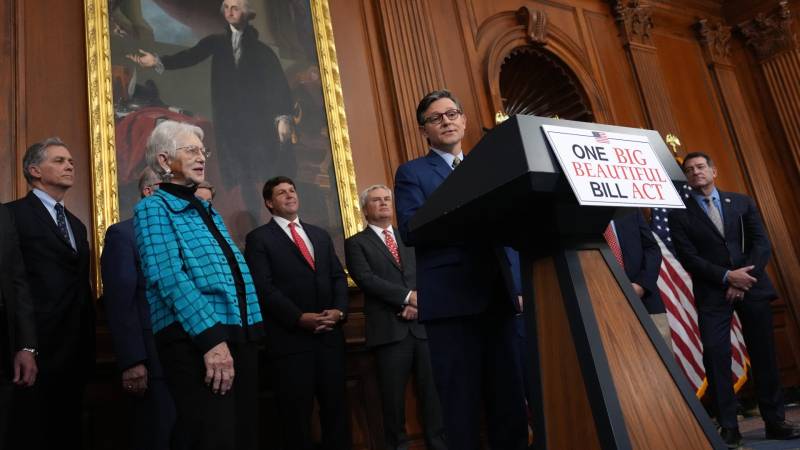President Trump’s budget bill rolls back clean energy initiatives, reduces Medicaid benefits, alters student loan rules, and extends tax cuts to the wealthiest, among other initiatives. It passed in the House by a bare margin, but Republican senator Ron Johnson has called the bill “divorced from reality,” indicating that it may face headwinds in the Senate. We talk with reporters about what’s in the 1000-plus page bill and its political implications.
How Trump’s Massive, Wide Ranging Budget Bill Could Affect You

Guests:
Russell Berman, staff writer, The Atlantic
Claudia Grisales, congressional correspondent, NPR
Show Highlights
Medicaid Cuts and Healthcare Implications
Medicaid Cuts and Healthcare Implications
The most contentious provision of Trump’s new budget bill is its proposed cuts to Medicaid, the federal program serving low-income Americans. “They are indeed looking at reductions in those areas,” NPR congressional reporter Claudia Grisales warns. Under this plan, able-bodied adults would face new work requirements to maintain benefits—measures that Russell Berman estimates could slash roughly $260 billion from Medicaid over the next decade.
Moderate Republican senators like Susan Collins (R-ME) and Lisa Murkowski (R-AL)have voiced strong opposition, fearing millions could lose coverage. Grisales points out that senators have heard those concerns: “In some cases, it looks like they’re moving forward in ways that signal they want to act on them and make sure that folks do not lose coverage.”
The stakes extend far beyond paperwork. One caller, 80-year-old Irene from Berkeley, worries she will lose not only her secondary insurance but also her hearing aids.
Clean Energy Rollbacks and Environmental Consequences
Clean Energy Rollbacks and Environmental Consequences
The budget bill would also roll back key clean-energy incentives enacted under the Biden administration. In Republican framing, this is labeled as “repealing the so-called Green New Deal.” In practical terms, the proposal eliminates or curtails tax credits for electric vehicles, wind and solar projects and other renewable initiatives. However, Republican senators from states with significant clean-energy investments are pushing back.
Concern about the long-term environmental impact runs high. Listeners warn that scaling back research and incentives for clean energy jeopardizes future generations’ health and economic prospects. Many fear that cutting support for renewables will only reinforce reliance on fossil fuels, echoing Trump’s earlier “drill, baby, drill” policies.
Tax Cuts and the Growing Divide in Income
The legislation would extend the Trump-era tax cuts of 2017 too—legislation that overwhelmingly favors the wealthy. Atlantic staff writer Russell Berman cites the Penn Wharton budget model: families earning under $22,000 per year would see their after-tax income fall by $1,500, while those making over $5.2 million would gain $104,000. “If these cuts go away, your taxes go up,” Berman explains. “These are the constituents Republicans worry about.”
Critics argue the tax-cut extension deepens income inequality and balloons the federal deficit. Listener Susan puts it plainly: “I’ve yet to hear anyone justify continuing the 2017 tax cuts. Did they help the economy or simply add to the deficit?” It’s a tough question, Berman says. “The economy seemed strong in 2018 and 2019—but then 2020 hit with the pandemic.” The debate hinges on whether short-term growth outweighs long-term fiscal damage.
Deficit Concerns and Fiscal Responsibility
For a party that prides itself on fiscal discipline, the budget bill’s trillion-plus dollar price tag has ignited fierce debate. “Republicans have historically championed balanced budgets—yet this bill adds trillions more to the deficit,” one listener notes.
Grisales pinpoints the fracture: “When it comes to the deficit, that’s the biggest fight that held up this legislation in the House. President Trump had to lean on deficit hawks like the House Freedom Caucus to get it through.”
Senator Ron Johnson (R-WI), among others, is pushing for even deeper cuts—potentially $2 trillion or more. But Berman casts doubt on the GOP’s follow-through: “They campaign on cutting spending but, when in power, cut taxes instead, exploding the deficit.” The recent Moody’s downgrade of the U.S. credit rating—the first in history—highlights the danger of continued inaction. As Grisales points out, the downgrade is part of a troubling trend, with U.S. credit ratings gradually slipping for years.
Legislative Process and Political Implications
Steering this bill through Congress has been a fraught process. “It’s getting harder to move legislation amid today’s deep partisan divide,” Grisales explains. Republicans are relying on budget reconciliation to bypass the 60-vote filibuster threshold and pass the package with a simple majority. But their grip on Congress is razor-thin—with just a 3- or 4-seat edge in the House and the ability to lose no more than three votes in the Senate—leaving virtually no margin for error.
Berman points out additional challenges, noting that even moderate Senate Republicans are criticizing the bill as unrealistic. He adds that controversial measures, such as cuts to Planned Parenthood or penalties for certain officials, could spark new conflicts.
This content was edited by the Forum production team but was generated with the help of AI.